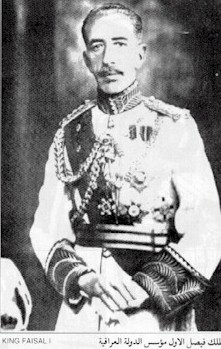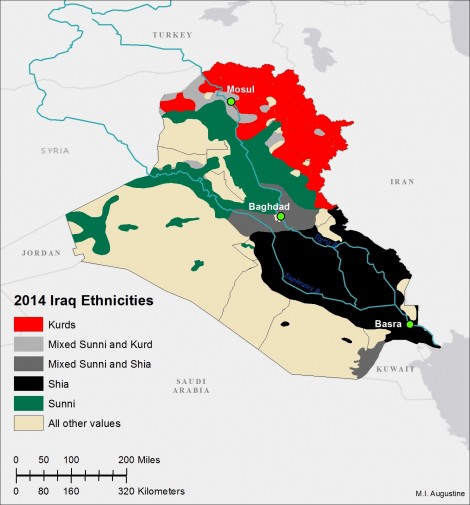By M.I. Augustine:
From the time Cyrus the Great of Iran conquered Babylon in 539 B.C., all the way until British cartographers created something called “Iraq” in 1920, the area along the Tigris and the Euphrates rivers was never a united political entity. Due to one very important business interest, the British, after WWI, clumsily drew lines on a map and united three former provinces of the Ottoman Empire: Basra, Baghdad, and Mosul. Today, we have forgotten that at the heart of the current fiasco in Iraq lies this disastrous imperialist creation: an artificial failed state.
The British creation of Iraq was a strategic imperialist maneuver, made in order to gain access and control to the newly discovered and highly coveted natural resource of oil. The British were well aware that prior to the end of WWI “the land between the rivers,” or Mesopotamia, existed within the Ottoman Empire as a decentralized territory consisting of three distinct semi-autonomous provinces called “Vilayets.” In each of these Vilayets lived a different ethnic and religious group. Along the rivers, heading northwest to southeast on a map, Kurds lived in the northern Mosul Vilayet, Sunnis to the south in the Baghdad Vilayet, and Shias in the southeastern Basra Vilayet.
Even in the letters exchanged during the Husayn-McMahon Correspondence (1915-1916) two exceptions had been made in response to Husayn’s demands for Arab independence: Baghdad and Basra. It just so happened that these areas were already known to be rich with oil; and Henry McMahon, the British High Commissioner in Egypt, assured Husayn ibn Ali, the Emir of Mecca, that no matter what, special consideration must be made to British interests there. This stipulation remained a point of contention in the Correspondence but was solidified as a certainty in the Sykes-Picot Agreement of 1916, which carved the Ottoman territories into mandates to be administered separately by the British and the French after the conclusion of the war.
After the war ended, the Treaty of Sevres (1920) vastly reduced the Ottoman Empire to a Turkish state and required the Turks to relinquish control over the Arab, Armenian and Kurdish lands, providing for, among other things, the establishment of an independent Armenistan and Kurdistan. The Kurds, an ethnic group with their own language and traditions, distinct from the Arabs, Persians, and Turks were also employed in the fight against the Ottomans. The British, during the war, had engendered a revolt among several groups living under Ottoman rule, in exchange for promises of independence.
However, three years after the signing of the Treaty of Sevres, the agreement was rejected by the newly formed Turkish nationalist regime, led by Kemal Ataturk, and was replaced with the Treaty of Lausanne (1923). In this new treaty, formed after a seven month conference in Switzerland, the original plan of an independent Kurdistan was discarded, leaving the Kurds, (who were not even invited to the conference) to remain under the control of Turkey and the supremely oppressive Ataturk, along with other foreign governments, in a four-state “solution” that denied them autonomy in their own homeland. For the next eighty years, any move towards independence by the Kurds would be met with a brutal response. In return for denying the Kurds a state, Ataturk assured that the Turkish straits, between the Aegean and Black Seas, would be available to the Western Powers for shipping.
Three years prior to the Treaty of Lausanne the British mandate of “Iraq” had been established, and the British imperial mapmakers conveniently fused the former Ottoman Vilayet Mosul with the already coveted oil-rich Baghdad and Basra. By War’s end, oil had been discovered in Mosul as well, and the three former autonomous provinces were conveniently united to form one nation. Between the Treaty of Sevres and the Treaty of Lausanne, the British had turned their backs on the Kurds, just as they had done to the Arabs, foregoing the promise of independence in favor of an imperialist agenda and the establishment of a Jewish homeland in Palestine.
In 1921 British Prime Minister David Lloyd George appointed Winston Churchill as Colonial Secretary and head of the Middle East department. Churchill’s duty was to help establish friendly, loyal governments in the newly formed British mandates, and assure the protection of British economic interests, especially in Iraq. Gertrude Bell, an imperial servant, played a remarkable role in the colonial period of Iraq, making her home in Baghdad and even personally drawing the Iraqi borders with Saudi Arabia and Kuwait. She helped draft a constitution, and imported Faisal I from Arabia and established him as King of Iraq.
The interesting fact about these crucial years after WWI was that the Western Powers were actually well aware of the Right course of action to take. If peace had truly been the central motivation behind the treaties that were signed, self-determination surely would have been granted. If any lesson was learned out of the aftermath of “The Great War,” it was the importance of self-determination as a crucial component for peace. Self-determination can broadly be defined as the right of a people to determine its own destiny. It was a point of extreme emphasis in U.S. President Woodrow Wilson’s 14 Points speech, it was the benchmark in the establishment of the League of Nations, and would later become a legal right under international law in the United Nations charter following WWII.
For those who knew the region and the people living in the areas along the Tigris and the Euphrates rivers, like T.E. Lawrence, a famous British military officer and diplomat during WWI, they knew that self-determination was the only way for peace to last. Hania Farhan, the Director of Research for the Governance and Justice Group, commenting on T.E. Lawrence’s 1918 map, which was displayed at the Imperial War Museum in London in 2006, said, “The map shows that the opinions of those who knew the region well were often ignored, as the colonial powers in London and Paris had their own agendas and did not appear to care about the facts on the ground or the people of those areas. Lawrence’s proposed borders differ substantially from those that ended up being put in place.” In a BBC News report on the 2006 Exhibition of Lawrence’s map and proposals, the author writes, “Lawrence opposed the allied agreement which eventually determined the borders of Iraq as it is now. He said separate governments should operate in the predominantly Kurdish and Arab areas in what is now Iraq.”
Sadly, this was all ignored, and the treaties that were signed and the maps that were made, that so ominously set the stage for the violence and corruption in the Middle East that defined the hundred years that followed, denied self-determination in the region, in favor of the old colonial and imperialist method of centralization, the unitary nation-state. This established top-down control, and most importantly, allowed easy exploitation of natural resources.
On June 5, 2015, David Brooks wrote an op-ed for The New York Times, reminding his readers that the “core logic” in plans like those put forth by Joe Biden and Les Gelb in 2006, proposing decentralization in Iraq, “is still the most promising logic today.” Though certainly correct, what Brooks fails to mention is that these plans were not invented in 2006. It is not just “the most promising logic today,” it was the most promising logic at the end of WWI as well, but logic has nothing to do with why we have not seen them implemented.
The British after WWI, the U.S. now, and Joe Biden since entering the White House, all converted to the plan of centralization in Iraq for the same reason. Imperialists have always favored centralization over decentralization in resource-rich regions. This is because the establishment of a strong central government that is willing to secure arrangements and guarantee open access to a country’s natural resources, in an exchange for power, is a much more desired business partner than a decentralized territory with self-ruled and self-determined governments that could potentially nationalize their natural resources and disallow “foreign investment.”
To understand the implication of self-determination for Iraq today, we must first stop seeing “Iraq” as a political entity with legitimate territorial integrity. We must see it as a misguided creation of colonialists, and see its longevity as nothing more than neo-colonialists’ refusal to let it go. We must see that the preservation of peace has been and still is secondary to economic interests; and that U.S. national security is secondary to the profits of multi-national corporations. Only then can we begin working to end imperialism, and the violent radicalization that it causes, and start understanding, appreciating, and supporting the separate destinies of the three distinct peoples that were mistakenly brought together to form the artificial country that is “Iraq.”
M.I. Augustine is a geographer. He is interested in the political economy of the Middle East
.jpg)





Mr M.I. Augustine describes precisely how it went between the British and the French in their colonial projects from 1915 onwards. When the American president Woodrow Wilson joined the club in 1919 as its third member, the cards had already been shuffled, in fact Wilson was in his self-determination plan for all peoples of the world just tricked by Lloyd George and Clemenceau with the British mandate Iraq and the French mandate Syria.
Therefore it is so astonishing that against this background the Americans still don’t want to revise the present geographic landscape of Iraq and Syria, but stick by the former tricky arrangement by the British and the French, although they should and could know better nowadays by just reading once Mr Augustine’s marvelous article….